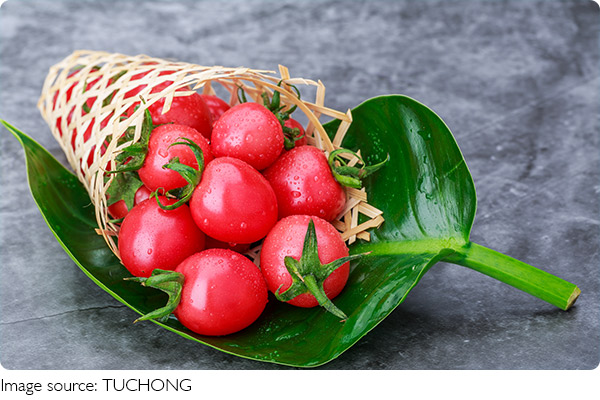Fresh Food Tricks

Hey Lykkers! Do you ever come home from the market, only to find your veggies wilting and fruits going soft just a day or two later? We've all been there. The good news is: it's not your fault—it's all about how we store our food.
Today, let's go through some clever and super practical food storage tricks that'll keep our meals fresh longer and save us from throwing food (and money) away.
How to Store Leafy Greens?
Leafy greens are tricky. They're fresh, delicate, and don't last long—usually only about 1 to 3 days. So we should only buy what we'll actually use in that time. Before putting them in the fridge, it's a smart move to remove any rotten or yellow leaves. Since greens lose moisture quickly, wrapping them in kitchen paper before sealing them in a clean food bag really helps them stay crisp.
One thing to remember: don't wash leafy greens before chilling them. The extra moisture can speed up spoilage. Also, avoid sticking them too close to the back of the fridge—it can get too cold and damage the leaves.

How to Handle Tomatoes, Cucumbers & Root Veggies?
Tomatoes, cucumbers, zucchinis, peppers, and green beans last longer—around 4 to 5 days. In cooler months, we can keep them in a dry, shaded spot at home. But during summer, it's better to pop them in the fridge using a fresh produce bag.
For root veggies like potatoes, pumpkins, and onions, it's best to avoid the fridge altogether. A dry, dark place—like a pantry or a kitchen cabinet—works best for keeping them fresh and firm.
Which Fruits Shouldn't Go in the Fridge?
Let's talk fruit. Some fruits just don't like the cold. Bananas, loquats, and pineapples, for example, can get black spots or spoil faster in the fridge. Instead, we can store them in a cool, ventilated area.
Got too many bananas? Try wrapping the stems with plastic wrap—it slows down ripening so we can enjoy them longer.
Tropical fruits like durians, mangos, papayas, and starfruit shouldn't be refrigerated when they're still unripe. Once they've ripened, we can seal them in a bag and refrigerate—but remember, they don't stay fresh for long after that, so it's best to eat them quickly.

Fruits That Love the Fridge
Fruits like cherries, blueberries, strawberries, grapes, lychees, and passion fruits are more delicate. Their skins are thin or they spoil easily, so they actually need cooler temperatures. A clean fridge and a breathable storage bag are perfect for keeping them juicy and fresh.
The Right Way to Store Eggs
Here's something we may not think about often—egg storage. We should place eggs with the larger end facing up. This helps preserve the air sac inside, keeping the egg fresh and breathable.
While many fridges come with an egg tray on the door, it's better to store eggs deeper inside the fridge. The door opens and closes frequently, causing temperature changes and the risk of cracks. Also, avoid washing eggs before storing them. That protective outer layer is key to keeping bacteria out. If the shell is dirty, we can gently wipe it with a damp paper towel and store separately.
Tips for Meat and Fish
Meat and seafood spoil fast, so if we're not cooking them the same day, it's best to freeze them in portions. That way, we only defrost what we need and avoid wasting the rest.
For seafood especially, the fresher the better. If we do need to store it for a day or two, we can rub it with a bit of salt, wrap it tightly, and place it in the fridge. But don't wait too long—it loses flavor and texture quickly.

Storing Tofu and Other Soy Products
Tofu and soy skin can be stored in the fridge for 1 to 2 days. If we've bought a larger batch, we can freeze a portion. Just remember to defrost gently and cook thoroughly before eating.
Extra Tips for Smarter Storage
Now here's the thing—the fridge isn't a magical storage vault. We still need to keep it tidy, clean it regularly, and sort foods properly. Store raw and cooked foods separately, and follow a "first in, first out" system to use up older items first.
If anything looks moldy or smells off, toss it immediately and check surrounding items to avoid cross-contamination.
Plan Before You Shop
According to China's Dietary Guidelines (2022), adults should aim for 200–300g of grains and roots daily, 120–200g of lean meats and eggs, over 300g of vegetables, and 200–350g of fresh fruits.
So before we head to the market, let's take a few minutes to make a shopping list based on how many people we're feeding. Cover the basics—veggies, meat, whole grains, and dry goods—and we'll avoid overbuying and wasting food.

Let's Store Smarter, Eat Fresher
Lykkers, by learning these small but mighty food storage tricks, we can make sure every bite we eat is fresh, tasty, and safe. Share these tips with your friends and family—because everyone deserves a fridge full of good food!
Got questions about your diet or what foods work best for you? Don't hesitate to visit a hospital nutrition department and ask the experts. Let's keep our kitchens smarter and our meals fresher together!


